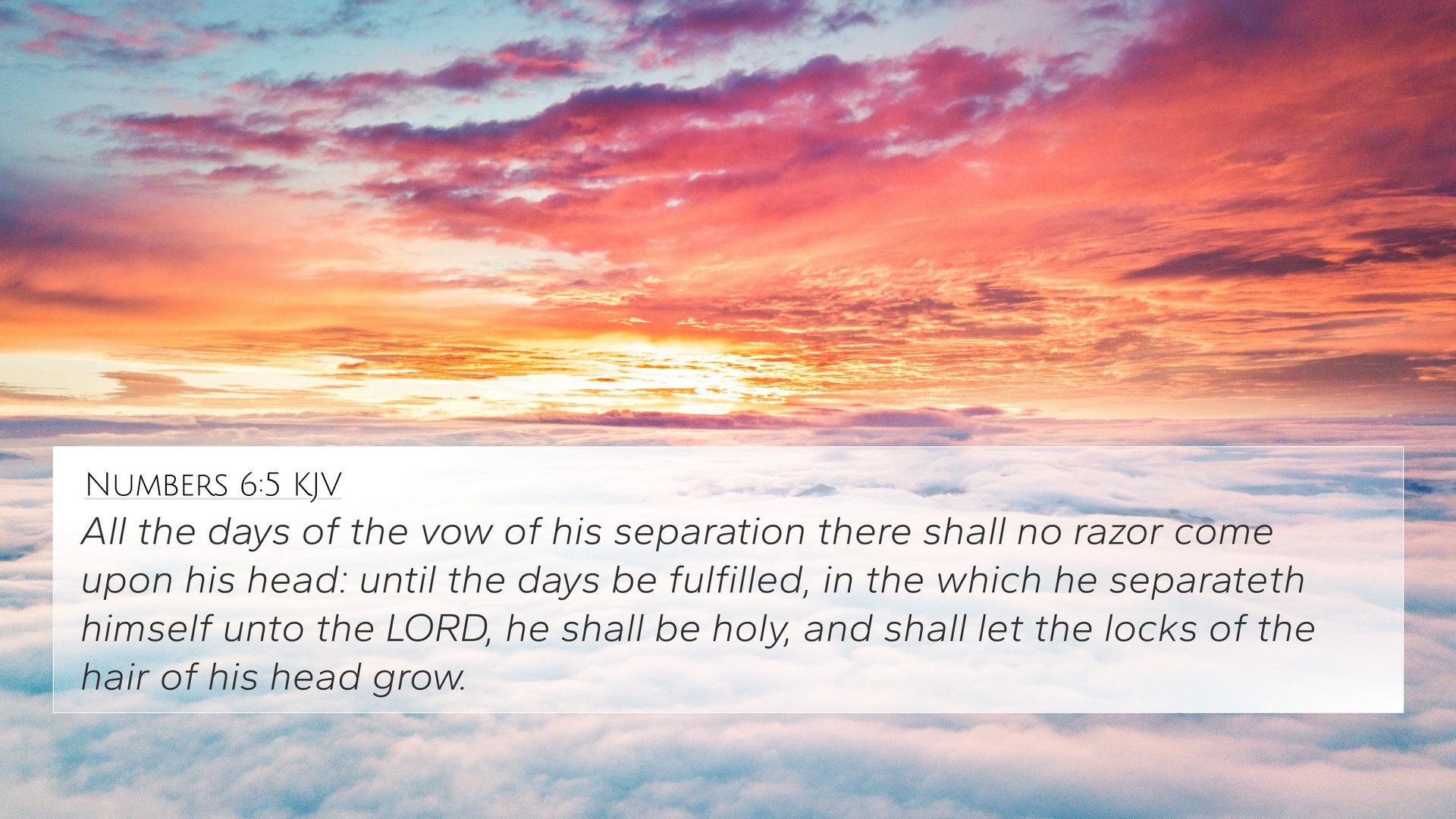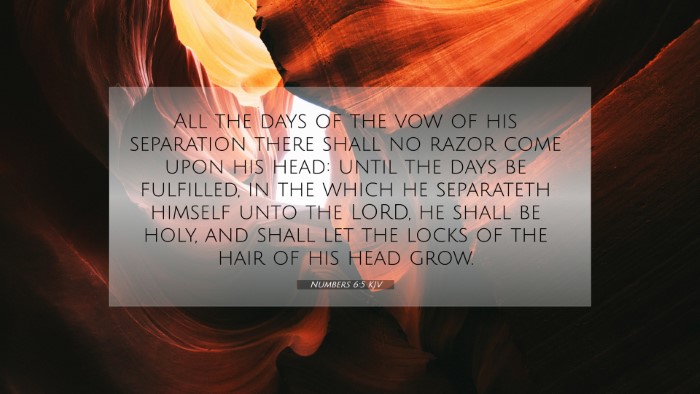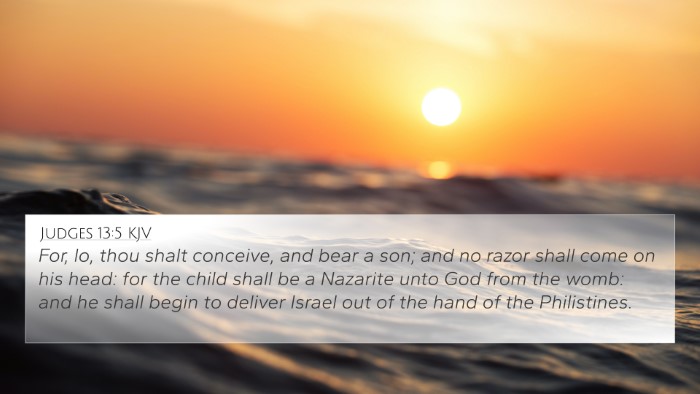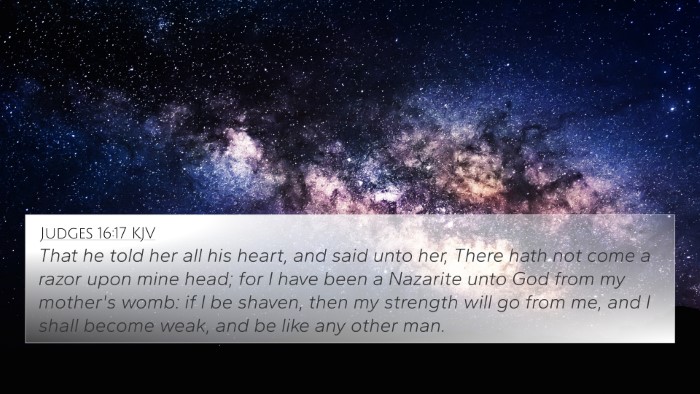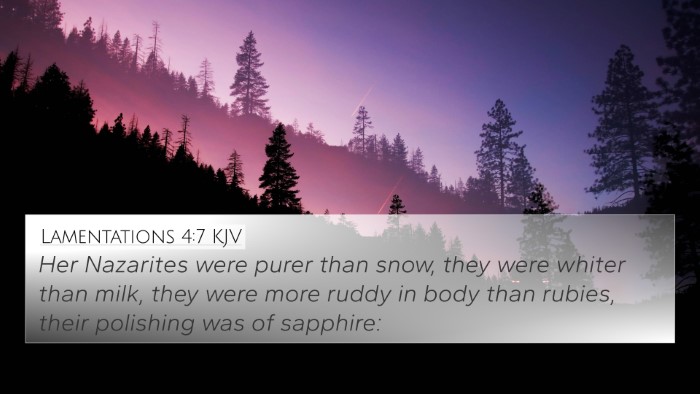Understanding Numbers 6:5
The verse Numbers 6:5 states: "All the days of the vow of his separation there shall no razor come upon his head: until the days be fulfilled, in the which he separateth himself unto the Lord, he shall be holy, and shall let the locks of the hair of his head grow." This verse pertains to the Nazirite vow, an outward expression of one's commitment to God.
Meaning and Significance
This verse emphasizes the following key points:
- Nazirite Vow: The vow signifies a period of dedication and sanctity, set apart for the Lord's service.
- Lifelong Commitment: The stipulations of the vow, including not cutting one's hair, symbolize inner holiness and separation from worldly practices.
- Physical Manifestation of Spiritual Dedication: The growth of hair acts as a visible testament of a person's commitment to God.
- Holiness: The verse reinforces the concept of holiness—being dedicated to God and refraining from defilement.
Commentary Insights
Here are combined insights from renowned public domain commentators:
- Matthew Henry: He points out that the uncut hair serves as a sign of the devotion to God. The commitment displayed in the vow mirrors a believer's dedication, illustrating the spiritual implications of physical acts of devotion.
- Albert Barnes: Barnes emphasizes that the vow represents an individual's separation from worldly pursuits to pursue a closer relationship with God. This separation was not merely ritualistic but was a matter of personal integrity and spiritual commitment.
- Adam Clarke: Clarke notes how the hair signifies strength and vitality, rooted in the Hebrew culture. He further discusses the implications of this vow for future generations and how it establishes a precedent in the Israelite community for personal commitments to God.
Bible Verse Cross-References
This verse does not exist in isolation, as it connects with several other scriptures that elaborate on the themes of holiness, separation, and dedication:
- Judges 13:5: Discusses Samson as a Nazirite, whose hair was a symbol of his strength and commitment to God.
- 1 Samuel 1:11: Hannah's vow reflects a similar commitment, showcasing her dedication to God's service through her son Samuel.
- Romans 12:1: Invites believers to present their bodies as living sacrifices, mirroring the dedication seen in the Nazirite vow.
- Ezra 10:6: The aspect of separation for holiness in the context of returning to Jerusalem emphasizes the importance of purity in the Lord's service.
- 1 Peter 1:16: "Be holy, for I am holy," reiterates the call to holiness, which correlates with the intent of the Nazirite vow.
- Leviticus 20:26: The call to holiness and the distinction between the people of God and nations implies a continual dedication to divine service.
- Numbers 6:21: Further explains the conditions of the Nazirite vow, linking it with the implications of personal dedication and sacrifice.
Thematic Bible Verse Connections
This verse can be linked to themes of dedication, purity, and Godly service that run throughout scripture:
- Dedication: The idea of setting oneself apart for God appears in numerous scriptures where individuals make vows of dedication.
- Purity and Holiness: A recurring theme where believers are called to live lives of holiness and separation from sin, as reflected in both the Old and New Testaments.
- Faith and Commitment: Similar expressions of faith, such as those made by Hannah and the apostle Paul, show a tradition of commitment to God's purpose.
Conclusion
Numbers 6:5 serves as a profound reminder of the importance of dedicating ourselves wholly to the Lord. Through cross-referencing other relevant scriptures, we find a rich tapestry of themes regarding commitment, holiness, and the significance of outward signs of our inward dedication. Whether studying for personal enrichment or sermon preparation, employing tools for Bible cross-referencing enhances our understanding of these connections.
Tools for Bible Cross-Referencing
To delve deeper into the connections within scripture, consider utilizing the following:
- Bible Concordance: A tool to find where specific words and themes appear throughout the Bible.
- Bible Cross-Reference Guide: A systematic approach to navigate through related verses.
- Cross-Reference Bible Study: Methods to explore and analyze scripture in conjunction with other passages.
- Bible Reference Resources: Various online and printed materials that help in studying verse connections.
- Comprehensive Bible Cross-Reference Materials: Collections that facilitate in-depth study of related themes within the Bible.
